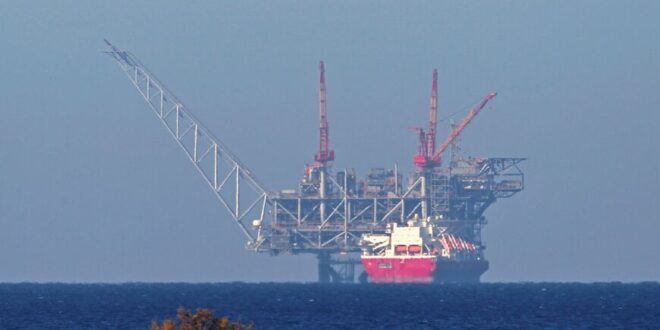The Cyprus conflict stands as a major stumbling block before potential plans to carry Israeli gas to Europe via Turkey.
The visit to Tel Aviv on May 26 by Turkish Foreign Minister Mevlut Cavusoglu and the news that Turkey and Israel are planning to re-establish formal diplomatic and economic relations has again raised the prospect that the two East Mediterranean states might also decide to cooperate to transit Israel’s sizeable gas reserves to Turkey and on to Europe.
First mooted over a decade ago following the discovery of Israel’s 620 billion cubic meter Leviathan gas field, plans to pipe Israeli gas to Turkey were sharply dropped following successive disputes between Ankara and Tel Aviv over Israel’s treatment of its Palestinian Arab population.
The past few years have seen Israel looking both at developing a terminal to export gas as LNG, and an ambitious project for a pipeline linking Israel with Cyprus and Greece, options which carry price tags of up to $6 billion, have both been discarded as uneconomic.
Now with the Russian invasion of Ukraine resulting in Moscow starting to turn off the gas taps to Europe and the EU looking to replace as much as a third of the 155 billion cubic meters of Russian gas it imports, from new sources in the Caspian and Mediterranean, interest in Turkey as a potential route to carry Israeli gas to Europe has suddenly been reignited.
While the two countries have yet to formally exchange ambassadors, expectations are already rising that serious discussions on the potential for gas transit will return to the agenda.
“The two foreign ministers have laid foundations which are a good anchor for business relations, and we will definitely see a visit by the Turkish energy minister to Israel soon,” said former US Ambassador Matt Bryza, who sits on the board of Turcas, one of the Turkish companies that was involved in a previous attempt at developing a gas pipeline from Israel to Turkey.
“Turcas is still interested in the project,” he added, explaining that as well as delivering new volumes of gas to Europe, a pipeline carrying Israeli gas could also help supply Turkey’s growing gas demand.
“Turkey’s gas demand was close to 60 billion cubic meters last year and will go higher.”
While there is no dispute that both Turkey and Europe could make good use of Israeli gas, laying a pipeline to deliver the gas to Turkey for transiting to Europe presents a number of commercial and political problems.
Most significant of these is Cyprus, through whose maritime Exclusive Economic Zone (EEZ) any pipeline would have to pass.
The island remains divided into two de-facto states: EU member state the Republic of Cyprus, which Ankara refuses to recognize, and occupying the northern third of the island, the Turkish Republic of North Cyprus (TRNC), recognized only by Turkey.
Repeated international efforts to reunite the island into a single state have failed with formal talks currently frozen since the start of the COVID pandemic.
Complicating matters further, the Republic of Cyprus has its own 128 billion cubic meter Aphrodite gas field it wants to develop, which could be fed into a pipeline carrying Israeli gas.
To date, though, Nicosia has refused to countenance any pipeline to Turkey without a settlement reunifying the island back into a single state.
According to Mithat Rende, former Turkish ambassador to Qatar and the OECD, and head of the Turkish Foreign Ministry’s energy desk, neither the continued division of Cyprus nor the need to route a pipeline through Cyprus’ EEZ need prevent a project to carry Israeli gas to Turkey from going ahead.
“If the US and the European Union strongly support a pipeline project to carry East Mediterranean gas to Turkey, there wouldn’t have to be a comprehensive political settlement (in Cyprus),” he said, explaining that it could be developed through an ad hoc arrangement between the various states and private sector companies.
Such a pipeline carrying up to 20 billion cubic meters a year of Israeli and Cypriot gas could be built within two to three years for as little as $2 billion, suggested Rende, pointing out that such a commercial arrangement drafted by lawyers and subject to international arbitration guarantees could only serve to enhance trust between the states involved.
With insufficient gas reserves to make developing its own export route commercially viable, Cyprus has little option but to consider a joint project with Israel.
Even in the event of Cyprus’ continued opposition, a pipeline through Cyprus EEZ to Turkey wouldn’t necessarily require permission from Nicosia.
“Under Article 79 of the United Nations Convention on the Law of the Sea (UNCLOS), there would just have to be an agreement with Cyprus and Syria over the route of the pipeline,” explained Rende, pointing out that the onus rests on Israel, the United States and the EU to convince Nicosia to engage.
If that succeeds, he added, the project could even be expanded to include gas from Egypt’s giant Zohr gas field, which contains another 850 billion cubic meters and could further increase the volumes of gas transited to Europe.
Getting four states to first agree to and then finalize a complex project such as an East Mediterranean gas pipeline though is far easier said than done.
An often-repeated energy sector aphorism has it that every additional country that joins a project adds at least another two years to negotiations.
With Russia having this week announced that it is cutting gas supplies to Denmark and Netherlands, it remains to be seen how long Brussels has before the Union starts to experience gas shortages.
 Eurasia Press & News
Eurasia Press & News



